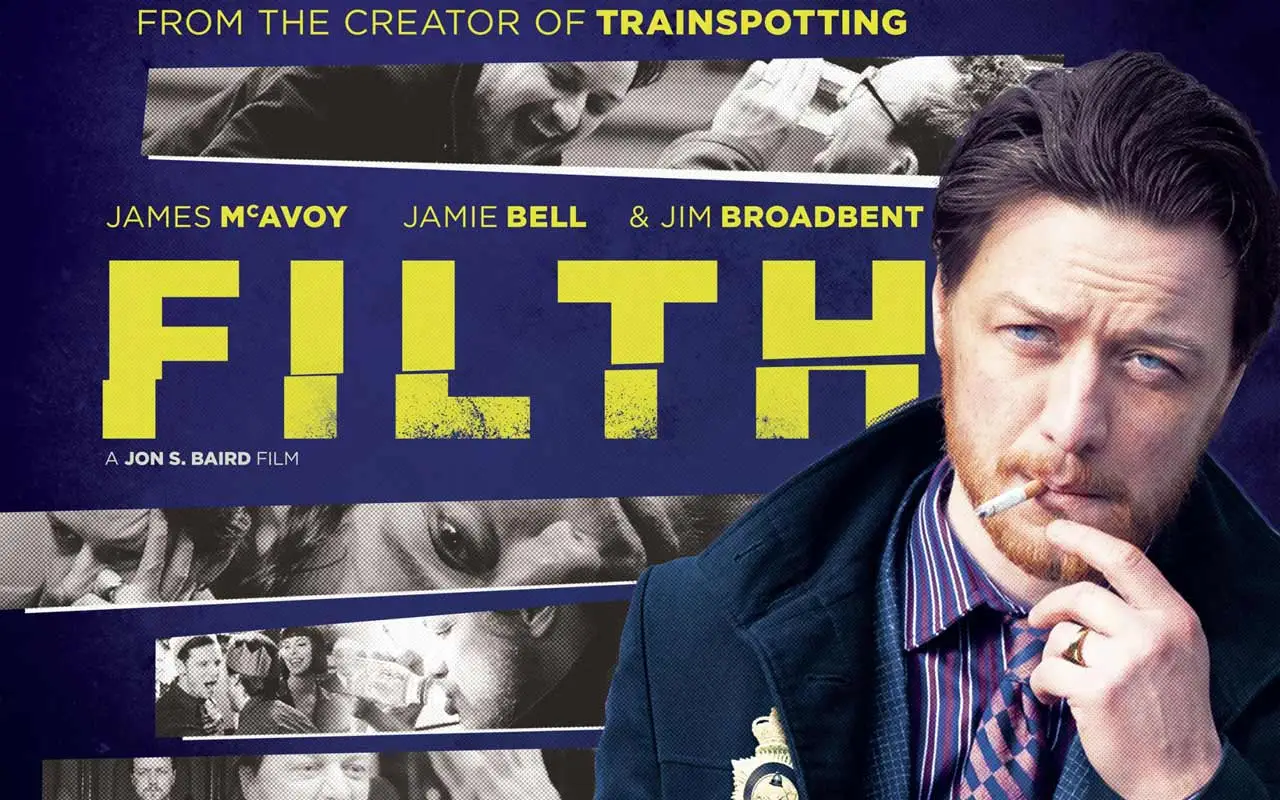Filth (2013)

“Filth,” released in 2013, is a daring psychological black comedy and crime thriller that offers a raw and unflinching look at the complexities of human nature. Directed by Jon S. Baird and based on the 1998 novel by Irvine Welsh, the film navigates the tumultuous life of its protagonist, Bruce Robertson, portrayed with remarkable intensity by James McAvoy. Combining dark humor with moments of disturbing reality, “Filth” challenges viewers to confront the depths of moral decay while providing a compelling narrative that resonates on multiple levels.
Set in Edinburgh, the film follows Bruce Robertson, a corrupt and deeply flawed police officer who is grappling with a myriad of personal demons. McAvoy’s portrayal of Bruce is nothing short of captivating, as he effortlessly embodies a character steeped in chaos, addiction, and self-loathing. Bruce is a man who appears to thrive in the dark corners of his mind, engaging in manipulative and destructive behavior that alienates him from those around him.
The film opens with a frenetic pace, immediately immersing viewers in Bruce’s chaotic world. As he navigates his daily life, filled with police work, substance abuse, and a twisted sense of humor, it becomes clear that Bruce is on a downward spiral. The narrative unfolds through a series of surreal and often darkly comedic vignettes, where Bruce’s interactions with colleagues, friends, and enemies reveal the complexities of his character. Each encounter serves to peel back layers of his psyche, exposing vulnerabilities beneath his brash exterior.
One of the film’s most striking features is its exploration of mental health and the effects of trauma. As the story progresses, it becomes apparent that Bruce’s behavior is deeply rooted in unresolved issues, including guilt, loneliness, and the aftermath of a traumatic event. The film cleverly uses flashbacks and surreal sequences to illustrate Bruce’s inner turmoil, blurring the lines between reality and hallucination. This narrative technique not only enhances the film’s psychological depth but also invites viewers to empathize with a character whose actions are often reprehensible yet ultimately tragic.

The supporting cast also contributes significantly to the film’s impact. Imogen Poots plays the role of a young woman who becomes entangled in Bruce’s chaotic life, while Jamie Bell delivers a strong performance as Bruce’s colleague and rival. The interactions between these characters serve to highlight Bruce’s moral decline, creating a stark contrast between his self-destructive behavior and the lives of those around him. The film adeptly captures the ripple effects of Bruce’s actions, emphasizing that his choices have far-reaching consequences.

Visually, “Filth” is striking, with Baird’s direction employing a bold and dynamic style. The cinematography captures the gritty essence of Edinburgh, juxtaposing its beauty with the darker elements of Bruce’s life. The vibrant colors and surreal imagery mirror Bruce’s mental state, adding layers of meaning to the film’s exploration of chaos and order. The pacing is brisk, ensuring that the film maintains its energy while allowing moments of reflection amid the madness.

The film’s score, featuring an eclectic mix of music, further enhances its tone. From pulsating beats to haunting melodies, the soundtrack complements the film’s emotional highs and lows, immersing viewers in Bruce’s tumultuous journey. The use of music also serves to underscore the film’s dark humor, creating a unique atmosphere that keeps the audience engaged and invested in Bruce’s fate.
“Filth” does not shy away from the more disturbing aspects of its subject matter. It tackles themes of addiction, abuse, and moral ambiguity, forcing viewers to confront uncomfortable truths about human nature. The film’s unfiltered portrayal of Bruce’s descent into madness is both shocking and thought-provoking, prompting discussions about the nature of morality and the struggles of mental health.

In conclusion, “Filth” is a daring and thought-provoking film that navigates the complexities of the human psyche with dark humor and raw honesty. Jon S. Baird’s adaptation of Irvine Welsh’s novel brings to life a character whose flaws and struggles resonate deeply, thanks in large part to James McAvoy’s extraordinary performance. Through its exploration of addiction, trauma, and the consequences of one man’s choices, “Filth” challenges viewers to reflect on their own moral compass while providing a uniquely engaging cinematic experience. With its blend of psychological depth, dark comedy, and a captivating narrative, “Filth” stands out as a remarkable entry in the genre, leaving a lasting impression on those who dare to venture into its world.
Suggested videos for you:
Tomorrowland (2015)
Suggested videos for you:
The Turning Point of World War II: The Battle of Midway
Suggested videos for you:










